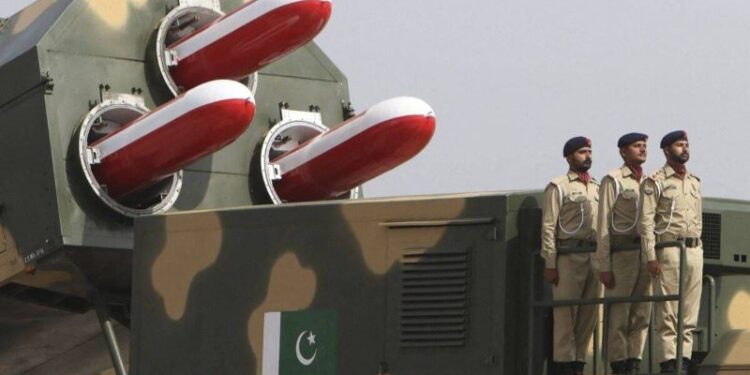Pakistan supplied munitions and arms to Ukraine in return for the recent bailout to the South Asian country by the International Monetary Fund (IMF) in a deal brokered by the United States, leaked documents have revealed.
According to an investigation by The Intercept, two sources with knowledge of the arrangement, as well as internal Pakistani and American government documents, revealed that Pakistan had succumbed to US pressure to covertly support Ukraine in its ongoing war against Russia in return for a guarantee that Washington would get the IMF to approve a multibillion dollar loan package to Islamabad.
In recent months, there emerged media reports suggesting that Pakistan had been supplying Ukraine with munitions, with The Intercept itself reporting, last month, that the US and Pakistan had agreed on such a supply to be conducted between the summer of 2022 to the spring of 2023.
According to the leaked documents, the arms deals were brokered by Global Military Products, a subsidiary of the US-based company, Global Ordnance, which has vast connection with authorities in Ukraine and has been instrumental in supplying Kyiv with weapons to fuel its defence against Russia’s invasion.
The investigation found a major link between those arms deals by Pakistan and the IMF bailout, as it came at a time when the bank informed Islamabad that it had to meet certain financing and refinancing targets regarding its debt and foreign investment in order to meet the conditions for the renewal of a loan package that was set to expire on 30 June this year.
Borrowers must be able to demonstrate that they can finance repayments and “Pakistan is no exception” to that rule, the IMF’s Pakistan representative, Esther Perez Ruiz, told Reuters in an email back in March.
The financing that Pakistan required, which was reportedly set at $6 billion, was a struggle for the country to acquire, with the government claiming that it had secured around $4 billion in commitments from Arab Gulf states. It, therefore, needed to secure a further $2 billion to meet the IMF loan eligibility requirements, and authorities discovered that the secret arms deal for Ukraine – worth $900 million – would enable Pakistan to add almost another billion dollars to that amount.
The trick was to persuade the US to inform the IMF of the undisclosed weapons deal in confidence, which Washington agreed to do during a private meeting between Pakistan’s ambassador to the US, Masood Khan, and Assistant Secretary of State, Donald Lu, at the State Department in Washington on 23 May. In that meeting, Lu had reportedly confirmed to Khan that the US had cleared payment for the Pakistani munitions production and would confidentially tell the IMF about the entire affair.
In a subsequent meeting between in Islamabad, the following Friday, between American ambassador to Pakistan, Donald Blome, and Pakistan’s then-Finance Minister, Ishaq Dar, they discussed the IMF matter in what seemed to be a normal development at the time.
Then, on 29 June, a day before the initial program was set to expire, the IMF announced an agreement – “a Stand-By Arrangement” – to provide Pakistan with $3 billion loan package which apparently had better terms and fewer strings attached than the expected extension of the previous program.
Up until these revelations, it was a mystery to many regarding how exactly Pakistan overcame its struggle to secure loans and how it managed to acquire a favourable package. The IMF deal came at a price, however, as the conditions stipulated that the country’s currency would be allowed to float freely without intervention from the State Bank of Pakistan, and that energy subsidies would be withdrawn. This resulted in a worsened energy crisis amongst the Pakistani population, as energy prices have now spiked by almost 50 per cent in the energy-starved nation.
Despite those effects, it was seen as a critical move to secure Pakistan’s short-term economic survival, with experts predicting that there would have been a full economic meltdown. It essentially eased economic pressure while, at the same time, giving time and relief for the country’s military establishment to strengthen control and increase the crackdown on supporters of ousted former prime minister, Imran Khan.
According to The Intercept, a US State Department spokesperson denied Washington’s role in the affair, stating that “Negotiations over the IMF review were a matter for discussion between Pakistan and IMF officials”, and that the US “was not party to those discussions, though we continue to encourage Pakistan to engage constructively with the IMF on its reform program.”
IMF spokesperson, Randa Elnagar, also denied that the Fund was pressured, saying that “We categorically deny the allegation that there was any external pressure on the IMF in one way or another while discussing support to Pakistan.” She did not, however, comment on whether the US secretly informed it of Pakistan’s agreement to supply arms to Ukraine.
Source: Middle East Monitor






 WhatsApp us
WhatsApp us 

